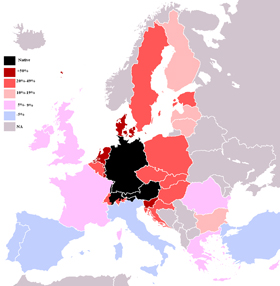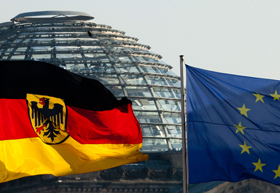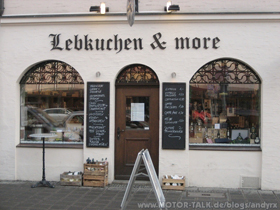Because of the emergence of the new world order's contours, changing geopolitical and economic balances, as well as the globalization of government, information space and human culture, ever more people are driven to wonder about the global linguistic landscape in the near future.
Will Europeans retain their languages in the United States of Europe? Will simplified English become the lingua franca of the 21st century? Finally, will Arabic prevail over French, Spanish or German in Europe? All these questions do need attention and individual answers.
This article is devoted to German, the state language of one of Russia's major economic and political partners, and will attempt to define its place in the global political context.
German Soft Power
In recent decades, the phenomenon of soft power has become a staple in the debates of political scientists, sociologists, economists and other scholars. Developed by American strategists to maintain and fortify U.S. competitive advantages in politics and economy, the concept has been taken up by many countries, since it often brings excellent results at low cost. Germany has long since come to realize the importance and capabilities of this tool and is working hard to promote German language and culture overseas. To fulfil this objective, many government and private institutions have been set up, the most potent being the German Academic Exchange Service and the Goethe Institute, a major culture promotion institution engaged in training German language teachers and offering free German teaching. Holders of Goethe Institute certificates enjoy a visible advantage for admission to German universities and application for a German residence permit. However, the key is not in the language training but rather in advancing the positive image of the FRG over the globe. First-hand acquaintance with German culture and politics often helps foreigners to drastically improve their impressions of the nation and the country. This aspect seems especially significant for the German-Russian relations, as Germany still bears the image of the enemy in Russian collective memory.
Such programs are delivering results, as the number of the German language learners (school-goers, university students, language course trainees, etc.) in Russia reaches 2.3 million and continues to grow.
German state and private foundations, as well as NGOs, are particularly active in the advancement of German as the language of official and citizen diplomacy, offering grants to Russian students, researchers and politicians, and assisting businesses to search for partners in both countries. In the lead are political structures, especially the Konrad Adenauer Foundation, the Hanns Seidel Foundation, the Friedrich Ebert Foundation, the Rosa Luxemburg Foundation and others. Private and nongovernmental structures also run target-oriented projects to advance German culture and language, with the total of such institutions climbing to several thousand.
German foundations, NGOs and language institutes are present in most countries of the world, including Russia, where over 6,000 German companies also have their offices [1]. As Russian leaders regularly reiterate, cooperation with such giants as Siemens, Bosch, Volkswagen etc. is strategically important for the modernization of the Russian economy. The Russian-German Foreign Trade Chamber has been working in Russia to coordinate bilateral business contacts for several years. Many federal states, for example Bavaria, also have their missions in Russia. Cooperation of this kind is likewise important for the export-oriented German industry, especially during the global economic recess. Hence, shaping a benign cultural and political environment for economic interaction is a key task of German business and political elites, while the German language offers an efficient instrument for its implementation.
Berlin is doing a great deal to advance German language abroad through financing the Goethe Institute and the Academic Exchange Service, holding Days of Germany and German Culture in various countries, and maintaining twin cities, youth exchange and humanitarian programs, which offers a model for Russia to arrange international promotion of its own language and culture.
The German Language in the World
What is the role of German today? Globally, there are from 100 million to over 180 million speakers in Europe, the U.S.A., South Africa, Australia, Russia and elsewhere. German is the official minority language in Italy and Hungary, and a domestic language in Canada, Argentina, Brazil and other countries. At the same time, its international communicative significance, especially taking account of the FRG economic potential, seems to be underestimated, which actually has its logic. Germany's presence in the UN is disproportionally low, whereas participation in the WTO is diluted by the EU's collective membership. As for NATO, OSCE, UNESCO and IMF, there are excessively strong U.S.-centric trends.
The issue of the German language's part in European integration and common EU institutions deserves special attention. The amalgamation of Europe is known to have been launched by German-French rapprochement in order to overcome the burdensome legacy of World War II. Currently, the EU bureaucracy employs German as a working language, but the specifics of the new democracies push them toward the English-language cultural and linguistic space. However, German successfully competes with French and Spanish for communication within Europe.
Deutsch or Denglish?
Although German retains its systemizing role in international contacts, it has been significantly modified under the pressure of English, the global communications vehicle, as well as certain political factors. The latter include gender activism and political correctness – just remember the recent story of how fairy tales by a known German author were purged of all Negro-related words, finding them to be derogatory. Dissemination of English – the language of economy, electronics and youths' subcultures – generates numerous slangy Anglicisms, while critics raise alarm about the language of Goethe and Schiller gradually morphing into an Anglo-German mix, a freakish blend of German and English words and expressions.
Finally, it seems inexcusable to overlook the influence of migratory processes. Despite huge government efforts to smoothen the assimilation of foreigners, parallel religious and ethnic communities keep emerging in Germany, among them Turkish, Arab and Russian. In Munich, Friedrichhafen or Berlin, there is no way to escape the Russian language spoken with sporadic German words. This is the language of Aussidelern, the Russian Germans who constitute an ethnic subculture and number as many as 1.4 million [2] expatriates from Russia and other FSU states. Still another group includes foreigners with a migration background, the cautiously worded term of the German statistics to describe foreigners who moved or were born in the FRG. According to the German Statistics Agency, the new Germans' population numbers up to 16 million [2], among them foreigners proper, refugees, children of mixed marriages, and migrants' children born in the FRG and holding German passports. In the Berlin district of Kreuzberg you will never find a signboard in German, while genuine Berliners prefer to avoid the second largest Turkish city after Istanbul, proudly titled so by the new Germans.
Views on the role of migrants in the recipient society differ. Some see economic benefits, others extol the reciprocal enrichment of cultures, and still others foretell self-elimination of Germany. But the bare facts are more than telling. According to German demographers, by 2050 the FRG will have 60 percent of natives within the optimistic scenario, and about 40 percent otherwise [2]. The Kosovo story began in just this way. As of 2009, in such big cities as Berlin, Hamburg, Munich and Stuttgart 50 percent of children under 10 years of age were born to migrants' families. Seventy percent of Turkish adolescents from the age of 14 to 18, who may choose either German or Turkish citizenship, prefer to become citizens of their historical motherland [3]. In 20-30 years, the crucial issue is going to be not only who will speak German but also what kind of German is spoken. Will we witness a sort of socio-cultural apartheid with de facto two societies, two languages and two worlds? No answers seem yet to exist to these fundamental questions.
* * *
Despite the challenges facing Germany and the German language, the tongue of Wolfgang Goethe, Friedrich Schiller, Thomas Mann and Gunter Grass is far from doomed. Although the dissemination of English in global business communication is extensive, one may say that an optimist would learn English but a realist would nevertheless choose German. As far as the future is concerned, in the coming decades German is sure to retain its role in Europe and EU institutions. And do not forget that its competitors are also vulnerable. Some predict a drop in U.S. geopolitical influence that will call into question the hegemony of English in international communication. Of course, global or even European domination by the German language does not seem likely, but it has the potential to retain its status and even gain some more clout, definitely giving it an optimistic future.
1. Germany. Challenges of the 21st Century / Edited by V.B. Belov. Moscow: Ves' Mir Publishers. 2009 2. Migrants in the FRG: New Trends and Old Problems // Reports of RAS Institute for European Studies. Report 267: Germany 2010. Moscow, 2011, P. 114
3. A New Germany – Deutschland or Turkland? // Reports of RAS Institute for European Studies. Report 279: Germany 2011. Moscow, 2012, P. 121








